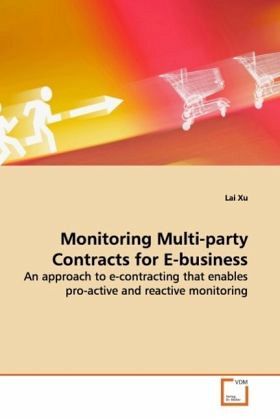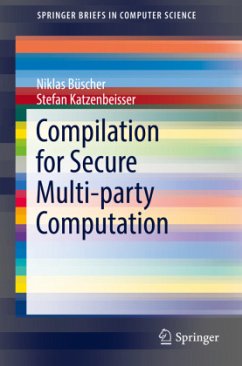
Monitoring Multi-party Contracts for E-business
An approach to e-contracting that enables pro-active and reactive monitoring
Versandkostenfrei!
Versandfertig in 6-10 Tagen
45,99 €
inkl. MwSt.

PAYBACK Punkte
23 °P sammeln!
Contracts between multiple business parties play animportant role in a global economy where activitiesalong the value chain are executed by independent,co-operating organizations. Information technology toenact a value chain is now being deployed in the formof ERP systems and service oriented architectures.However, little is known about how to verify whethersuch an enactment indeed fulfills the contractbetween the parties. This book investigates how toformalize a contract which could support not only thedetection of actual violations, but also thepro-active detection of imminent contract viola...
Contracts between multiple business parties play an
important role in a global economy where activities
along the value chain are executed by independent,
co-operating organizations. Information technology to
enact a value chain is now being deployed in the form
of ERP systems and service oriented architectures.
However, little is known about how to verify whether
such an enactment indeed fulfills the contract
between the parties. This book investigates how to
formalize a contract which could support not only the
detection of actual violations, but also the
pro-active detection of imminent contract violations.
Under our monitoring mechanism, a multi-party
contract can be dynamically monitored during the
contract execution, and all responsible parties for a
contract violation under execution of a multi-party
contract can be detected. The work should shed some
light on monitoring multi-party contracts in
e-business environment, and should be especially
useful to researchers in business process
integration, business process outsource
monitoring, monitoring web service execution fields,
or anyone who may be considering issues of
monitorability and reliability of e-markets.
important role in a global economy where activities
along the value chain are executed by independent,
co-operating organizations. Information technology to
enact a value chain is now being deployed in the form
of ERP systems and service oriented architectures.
However, little is known about how to verify whether
such an enactment indeed fulfills the contract
between the parties. This book investigates how to
formalize a contract which could support not only the
detection of actual violations, but also the
pro-active detection of imminent contract violations.
Under our monitoring mechanism, a multi-party
contract can be dynamically monitored during the
contract execution, and all responsible parties for a
contract violation under execution of a multi-party
contract can be detected. The work should shed some
light on monitoring multi-party contracts in
e-business environment, and should be especially
useful to researchers in business process
integration, business process outsource
monitoring, monitoring web service execution fields,
or anyone who may be considering issues of
monitorability and reliability of e-markets.












